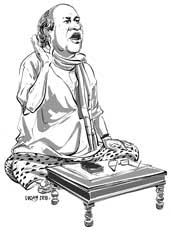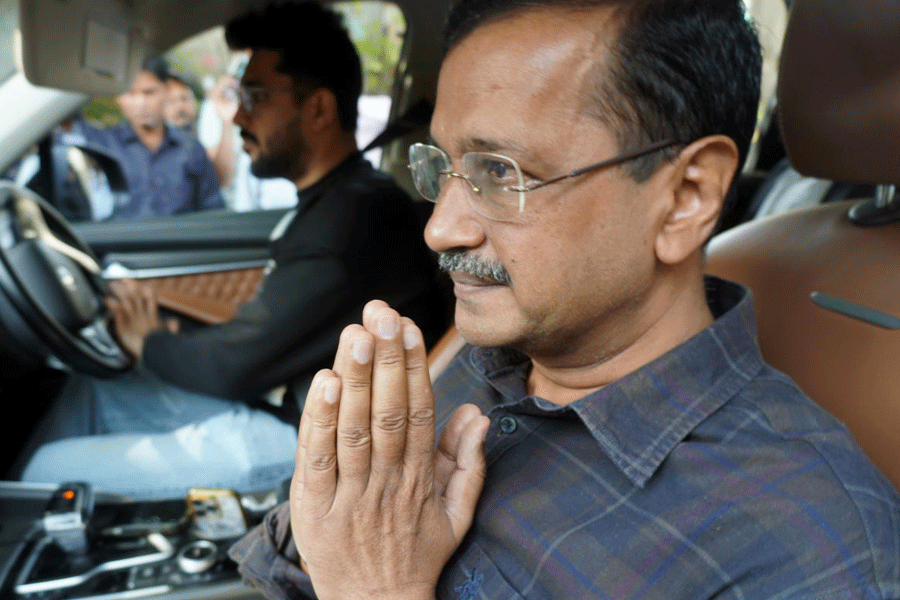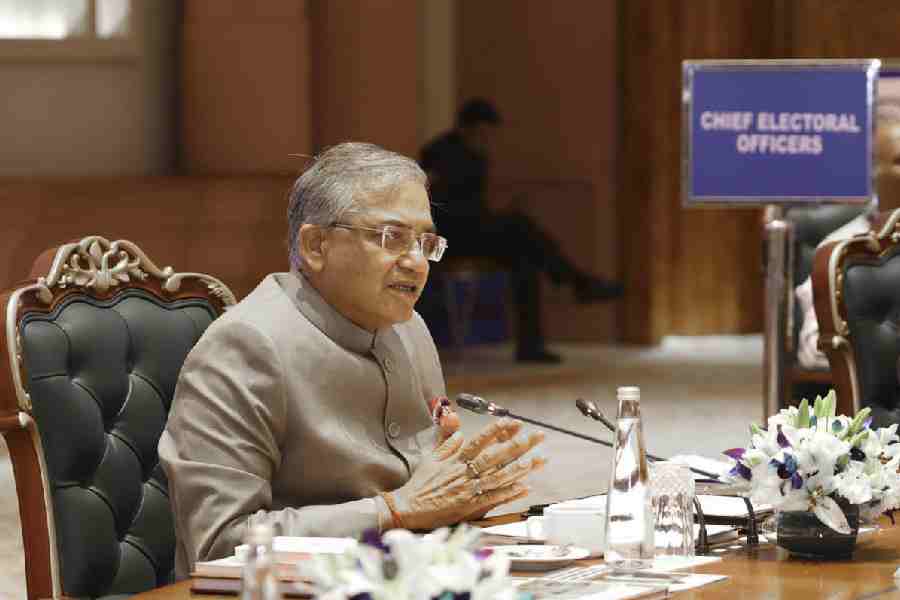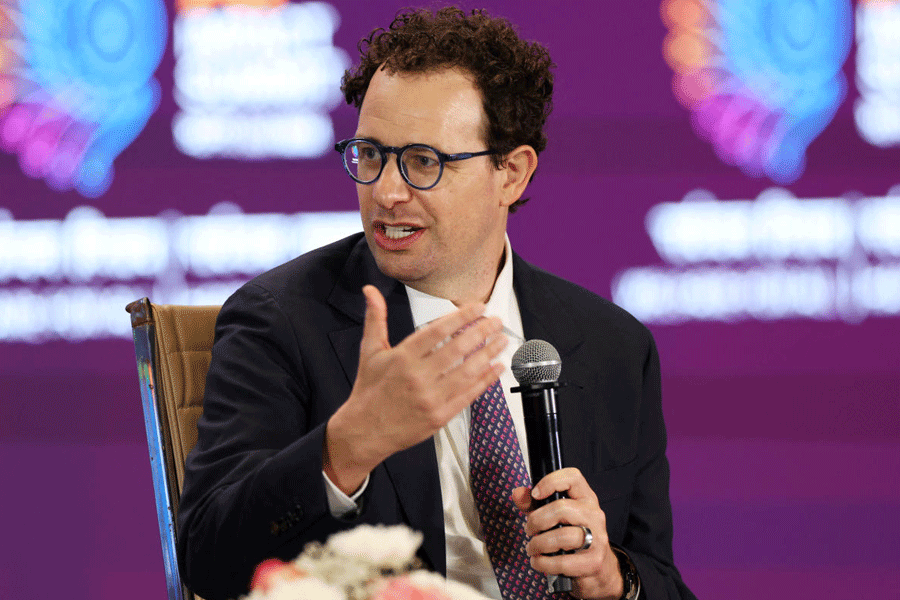 |
It all started with a steaming cup of tea. The year was 1958 and Subhas Chakroborty had just become a member of what was then the undivided Communist Party of India. On this particular day, the West Bengal transport minister, then barely 16 years old, had been entrusted with a special duty: serving Jyoti Basu tea at a public meeting. As the veteran Marxist leader took a seat on the podium off Jessore Road on the outskirts of Calcutta, Chakroborty stepped up gingerly and set down the earthen cup on a small table placed before him. But the table was wobbly and Chakroborty was afraid the tea would spill over and taint Basu’s crisp white kurta. Not knowing what to do, he stood there holding the cup. “Don’t worry. Just leave it there and go,” Basu said, putting the young party worker at ease.
An instant connection — as Chakroborty now recalls — was established between the two. It’s a relationship that has survived the shifting sands of time. Today, the 65-year-old leader says his political life revolves around Basu and that he “clutches at” him much the same way a “common man clutches at God, knowing full well that bhagwan can hardly save him in times of trouble.”
Chakroborty’s words may turn out to be prophetic as he wages an undeclared — and some say a losing — war on Bengal chief minister Buddhadeb Bhattacharjee. Chakroborty denies any “conflicts” between the two, but nevertheless says that he doesn’t “bow to anybody or stay quiet when someone calls a day a night and expects others to accept that.” Sure enough, differences between the two Marxist leaders are widening and seem almost as irreconcilable as day and night.
If he railed against the chief minister for fielding Calcutta police commissioner Prasun Mukherjee against Jagmohan Dalmiya in the last Cricket Association of Bengal election and threatened to run against Mukherjee this time, Chakroborty now slams the Bhattacharjee government for “mishandling” Singur, a sore point with the chief minister. He says the government acquired land for the Tatas’ car plant following the Land Acquisition Act and should have taken a legal, not moral, stance.
“Instead, they said they had taken the consent of the farmers, which they didn’t, certainly not from all of them. To cover up one lie, the government now had to tell five more lies and things got very complicated,” Chakroborty says.
Such words are not music to Bhattacharjee’s ears, but Chakroborty seems unperturbed. After nearly five decades with the CPM, he says he has few aspirations left, even fewer mountains to climb, even though he isn’t clearly ready to fade into the sunset. Not just yet. If anything, he will go down fighting and his tone of voice makes that clear. “I have been raising all these questions consciously, secure in my belief and faith in Marxism,” he says. He doesn’t know how long he will be “tolerated,” though. “I have been a minister for 25 years now and I have seen it all,” he says.
His modest two-storied house in Calcutta’s upscale Salt Lake is jammed with people as Chakroborty sits cross-legged on a carpeted floor in his first-floor living room, surrounded by visitors seated on plastic chairs and on the floor around him. Two phones ring every now and then. His wife, Ramala Chakroborty, also a party leader, hovers around, chiding him affectionately for “not doing enough” for those who have stood by him. He smiles. Behind him, a family portrait — of the Chakrobortys and their only son, Anubhab — hangs on the wall. A bookcase in the room has several titles by Rabindranath Tagore and a full-length portrait of the young poet stares down from a calendar.
His popularity among his supporters is legendary, which, besides the support of Basu, has so far acted as a buffer even though his detractors in the party have long been calling for his scalp. “You can erase me from a wall, but not from the people’s mind,” a fraying poster on his main door says, alluding to a ban on graffiti in the 2006 West Bengal Assembly election.
Born in 1942 in a village, some 24 km from Dhaka, now Bangladesh’s capital, Chakroborty was barely eight when his father left for Calcutta, joining a trickle of refugees that would turn into a tide and eventually deluge Calcutta and much of Bengal. If the life of a refugee boy taught Chakroborty — one of the 11 siblings — anything, it was that he should not “fear anything.” He distinctly remembers the night in their rented house in Nadia’s Birnagar where his father, a homeopath physician, had moved from Calcutta “in search of a home away from home.” The house had no electricity and, in the light of a lantern, his brother — in bed with him and with their father — spotted the two poisonous snakes on top of their mosquito net. The next day, the family returned to Calcutta , for good.
As a student at Dum Dum’s Motijhil College, Chakroborty got sucked into the ongoing Communist movement even though his father was a member of the Congress. As far as he remembers, it was 1957 and the Communist party picked him chiefly for two reasons: he wrote graffiti well and had at least 50 students moving with him all the time, Chakroborty says.
A year later, he was offered membership of the Communist party over some leaders’ objections that, at 16, he was too young. Yet his first experience of the party was far from impressive. At two consecutive meetings, he was asked to report at 4 pm on a Saturday, but was kept waiting for two hours before someone opened the one-room party office and asked him to sweep the floor. “I was really in two minds whether it was worth giving up a game of cricket on Saturdays for a party whose leaders never looked at the watch,” he chuckles.
Even in those days, Chakroborty, fiercely independent and strong-willed, found himself at odds with his party. He protested when his party leaders called Prafulla Ghosh, the late Congress chief minister of Bengal, names. Ghosh was so close to his father that he used to hide him in his house from the police much before he became chief minister. In fact, his mother told him that when he was a toddler, Ghosh would rock him on his lap, feeding him with a bottle of milk. “He was the most saintly person I had ever met and I could not take it when my party leaders called him a chor,” he says.
Chakroborty first heard of Buddhadeb Bhattacharjee when he was lodged in Calcutta’s Presidency Jail as a political prisoner in the mid-1960s. “I was then general secretary of the Students Federation of India (SFI) and Bimanda (Biman Bose, now CPM state secretary) asked me, in a letter, if Buddha could sign the statements as I was in jail,” he says. Subsequently, he met him at the party’s Calcutta district committee office.
The two leaders, seemingly, never hit it off. “His (Bhattacharjee) name came up when the party decided to float its youth wing (now DYFI, or the Democratic Youth Federation of India). After the party would not let me leave the SFI, he was named DYFI secretary. Though many had reservations about him, they did not say anything as he was a relation of the poet, Sukanta Bhattacharjee,” Chakroborty says.
The signs of animus remain. True, Chakrobroty has so far enjoyed Basu’s unstinted support. But what will happen when the veteran Marxist is not around? “Do you think the party will remain intact if they throw me out when Jyotibabu is not there? The party will get mauled,” Chakroborty says. “Don’t forget,” he cautions, that if Basu has been a “big shelter” for him, he, too, has been a “big shelter” for the party.










